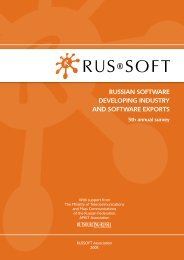russian software developing industry and software exports
russian software developing industry and software exports
russian software developing industry and software exports
You also want an ePaper? Increase the reach of your titles
YUMPU automatically turns print PDFs into web optimized ePapers that Google loves.
Chapter 6.<br />
Human Resources <strong>and</strong> the Labor Market Situation<br />
Average offered <strong>and</strong> expected salaries of <strong>software</strong> engineers (April 2009)<br />
Profession<br />
Average offered<br />
salaries, RUB/month<br />
(USD)<br />
growing till the end of 2008. This was followed<br />
by stabilization <strong>and</strong> a slight decrease for several<br />
specializations (for certain positions in cities with the<br />
highest level of salaries the annual reduction was<br />
25% by May 2008).<br />
According to Rabota@Mail.Ru, prior to the crisis<br />
salaries in the IT sector increased by 60–80% annually<br />
(source: CNews publication). In 2008 (before the<br />
crisis), in major Russian cities Perl programmer salary<br />
grew from USD 1,300–1,400 to USD 2,000–2,200.<br />
Before the very start of the crisis average statistical<br />
programmer claimed to earn USD 2,500 per month,<br />
whereas in early 2009 his maximum claims reduced<br />
to USD 2,300 (although usually offers dropped<br />
even lower).<br />
HeadHunters data show that in 2008 the salary of<br />
programmers in Moscow increased from RUB 55,000<br />
to RUB 60,000 (around USD 2,200–2,300). At the<br />
beginning of the last year, Java developer earned<br />
RUB 56,000 <strong>and</strong> .NET developer – RUB 54,000 (both<br />
around USD 2,200).<br />
According to Avanta Personnel, in 2008 salaries<br />
of IT-specialists increased by 18% on average <strong>and</strong> in<br />
<strong>software</strong> companies – by 10%. At the beginning of<br />
the last year testers in Moscow earned RUB 36,700<br />
(USD 1,470) <strong>and</strong> RUB 40,800 (USD 1,360) at<br />
the year-end.<br />
Average wages started to decrease in 2009. For<br />
instance, for Java developers it makes 25% in rubles,<br />
while 1С programmers lost RUB 7,000 (USD 230).<br />
Their average salary dropped from RUB 62,000<br />
(USD 2,500) to RUB 55,000 (USD 1,800).<br />
Due to ruble devaluation by 25% at the end of<br />
2008 the average the average reduction of salaries<br />
in currency in Q4 2008–Q1 2009 was 30% for<br />
programmers working for export.<br />
Nevertheless, no catastrophic salary decrease<br />
took place in <strong>software</strong> companies. Key developers<br />
remained on their positions <strong>and</strong> retained the<br />
level of pay. There occurred the rotation of staff<br />
accompanied with a certain reduction of bonuses<br />
<strong>and</strong> dismissal of unproductive employees. Despite<br />
a sharp change in the proportion of the number of<br />
vacancies to the number of resumes, the dem<strong>and</strong>s<br />
Average expected<br />
salaries, RUB/month<br />
(USD)<br />
Developer (C/C++) 60 000 (2000) 60 000 (2000)<br />
Develpoer (Java & J2EE) 60 000 (2000) 70 000 (2330)<br />
Developer (Delphi) 61 000 (2030) 60 000 (2000)<br />
Developer (Oracle) 62 000 (2070) 61 500 (2050)<br />
Web-developer (PHP, ASP.Net) 50 000 (1700) 50 000<br />
Developer (1C) 55 000 (1800) 70 000 (1700)<br />
Source: HeadHunter research department (published in CNews)<br />
of c<strong>and</strong>idates have not become less<br />
excessive. More often than not salary<br />
expectations of c<strong>and</strong>idates looking<br />
for jobs in <strong>software</strong> companies are<br />
higher than actual offers.<br />
Neither employers nor employees<br />
still have learnt to orientate<br />
themselves in new circumstances.<br />
Moreover, there is no clarity<br />
regarding the situation in the global<br />
IT market at least in the foreseeable<br />
future <strong>and</strong>, therefore, regarding<br />
business prospects.<br />
Many specialists earn as much<br />
as they did at the end of last year.<br />
Highly qualified professionals are still<br />
valued. The dem<strong>and</strong> for middle-level qualification<br />
specialists <strong>and</strong> developers who only start their careers<br />
has reduced.<br />
During the crisis there emerged new opportunities<br />
for business, which resulted in some companies even<br />
increasing salaries for their staff. According to the<br />
poll conducted by Avanta Personnel in Moscow <strong>and</strong><br />
St. Petersburg a fourth of IT companies raised salaries<br />
in January–March 2009 (results published by CNews).<br />
At the same time based on the on-line survey<br />
made by HeadHunters, salaries are delayed by 43%<br />
of IT companies. Most likely, this survey covered<br />
only specialists actively hunting for new jobs, i.e.<br />
representing not the most successful companies.<br />
$2000<br />
$1500<br />
$1000<br />
$500<br />
0<br />
$2500<br />
$2000<br />
$1500<br />
$1000<br />
$500<br />
$0<br />
Average salaries by companies' turnover, USD/month<br />
$881<br />
up to 0.5 MUSD<br />
$985<br />
from 0.5 MUSD<br />
to 4 MUSD<br />
$1728<br />
from 4 MUSD<br />
to 20 MUSD<br />
$1364<br />
over 20 MUSD<br />
Average salaries by location of companies, USD/month<br />
$2200<br />
$1451<br />
Moscow<br />
$1700<br />
$1692<br />
$1400<br />
$1200<br />
$891 $897<br />
-34% -0,4% -36% -25%<br />
St. Petersburg<br />
Poll 2008<br />
Novosibirsk<br />
Poll 2009<br />
Others<br />
55








